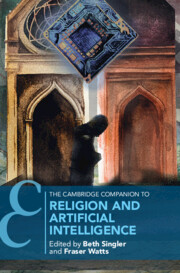Book contents
- The Cambridge Companion to Religion and Artificial Intelligence
- Cambridge Companions to Religion
- The Cambridge Companion to Religion and Artificial Intelligence
- Copyright page
- Contents
- Contributors
- Acknowledgements
- 1 Introduction
- 2 Steps towards Android Intelligence
- Part I Religions and AI
- 3 Hinduism and Artificial Intelligence
- 4 The Buddha in AI/Robotics
- 5 Artificial Intelligence and Jewish Thought
- 6 Artificial Intelligence and Christianity
- 7 Islam and Artificial Intelligence
- Part II Social and Moral Issues
- Part III Religious Studies
- Bibliography
- Index
- Cambridge Companions to Religion (continued from page ii)
- References
6 - Artificial Intelligence and Christianity
Friends or Foes?
from Part I - Religions and AI
Published online by Cambridge University Press: 20 November 2024
- The Cambridge Companion to Religion and Artificial Intelligence
- Cambridge Companions to Religion
- The Cambridge Companion to Religion and Artificial Intelligence
- Copyright page
- Contents
- Contributors
- Acknowledgements
- 1 Introduction
- 2 Steps towards Android Intelligence
- Part I Religions and AI
- 3 Hinduism and Artificial Intelligence
- 4 The Buddha in AI/Robotics
- 5 Artificial Intelligence and Jewish Thought
- 6 Artificial Intelligence and Christianity
- 7 Islam and Artificial Intelligence
- Part II Social and Moral Issues
- Part III Religious Studies
- Bibliography
- Index
- Cambridge Companions to Religion (continued from page ii)
- References
Summary
This chapter examines the various trajectories of Christian reflection on current and potential developments in artificial intelligence (AI). It reviews the theological questions generated by the emergence of intelligent machines and explores some of the most interesting solutions proposed in response to these quandaries. The first part is dedicated to inquiries about hypothetical AI developments and their potential implications for Christian theology. Could intelligent machines become authentic selves? If so, could they also partake in the image of God? Could the Christian imaginary envisage a future where robots develop their own religiosity and robotheologies? Could robots also aspire to be saved? The second section adopts a theological anthropological angle of inquiry, considering how insights gained from AI may contribute to refining this approach. What do our fascination with AI and our deep desire to create an intelligent other reveal about human nature? How would our theological self-understanding change if intelligent machines became ubiquitous?
- Type
- Chapter
- Information
- Publisher: Cambridge University PressPrint publication year: 2024

